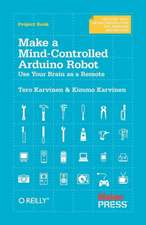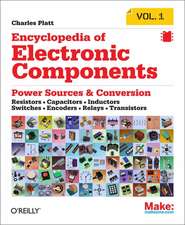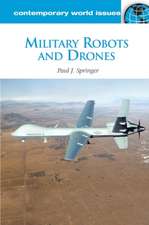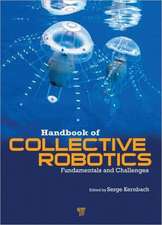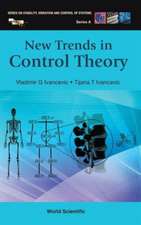Evolutionary Robotics: First European Workshop, EvoRobot 98, Paris, France, April 16-17, 1998, Proceedings: Lecture Notes in Computer Science, cartea 1468
Editat de Philip Husbands, Jean-Arcady Meyeren Limba Engleză Paperback – 12 aug 1998
The 15 revised full papers presented outline the state of the art in this new interdisciplinary area of research and development. The introductory paper gives a survey of the use of evolutionary computing techniques for the automatic design of adaptive robots.
Din seria Lecture Notes in Computer Science
- 20%
 Preț: 1061.55 lei
Preț: 1061.55 lei - 20%
 Preț: 340.32 lei
Preț: 340.32 lei - 20%
 Preț: 341.95 lei
Preț: 341.95 lei - 20%
 Preț: 453.32 lei
Preț: 453.32 lei - 20%
 Preț: 238.01 lei
Preț: 238.01 lei - 20%
 Preț: 340.32 lei
Preț: 340.32 lei - 20%
 Preț: 438.69 lei
Preț: 438.69 lei -
 Preț: 449.57 lei
Preț: 449.57 lei - 20%
 Preț: 343.62 lei
Preț: 343.62 lei - 20%
 Preț: 148.66 lei
Preț: 148.66 lei - 20%
 Preț: 310.26 lei
Preț: 310.26 lei - 20%
 Preț: 256.27 lei
Preț: 256.27 lei - 20%
 Preț: 645.28 lei
Preț: 645.28 lei - 17%
 Preț: 427.22 lei
Preț: 427.22 lei - 20%
 Preț: 655.02 lei
Preț: 655.02 lei - 20%
 Preț: 307.71 lei
Preț: 307.71 lei - 20%
 Preț: 1075.26 lei
Preț: 1075.26 lei - 20%
 Preț: 591.51 lei
Preț: 591.51 lei -
 Preț: 381.21 lei
Preț: 381.21 lei - 20%
 Preț: 337.00 lei
Preț: 337.00 lei - 15%
 Preț: 438.59 lei
Preț: 438.59 lei - 20%
 Preț: 607.39 lei
Preț: 607.39 lei - 20%
 Preț: 538.29 lei
Preț: 538.29 lei -
 Preț: 389.48 lei
Preț: 389.48 lei - 20%
 Preț: 326.98 lei
Preț: 326.98 lei - 20%
 Preț: 1414.79 lei
Preț: 1414.79 lei - 20%
 Preț: 1024.44 lei
Preț: 1024.44 lei - 20%
 Preț: 579.30 lei
Preț: 579.30 lei - 20%
 Preț: 575.48 lei
Preț: 575.48 lei - 20%
 Preț: 583.40 lei
Preț: 583.40 lei - 20%
 Preț: 763.23 lei
Preț: 763.23 lei - 15%
 Preț: 580.46 lei
Preț: 580.46 lei - 17%
 Preț: 360.19 lei
Preț: 360.19 lei - 20%
 Preț: 504.57 lei
Preț: 504.57 lei - 20%
 Preț: 172.69 lei
Preț: 172.69 lei - 20%
 Preț: 369.12 lei
Preț: 369.12 lei - 20%
 Preț: 353.50 lei
Preț: 353.50 lei - 20%
 Preț: 585.88 lei
Preț: 585.88 lei -
 Preț: 410.88 lei
Preț: 410.88 lei - 20%
 Preț: 596.46 lei
Preț: 596.46 lei - 20%
 Preț: 763.23 lei
Preț: 763.23 lei - 20%
 Preț: 825.93 lei
Preț: 825.93 lei - 20%
 Preț: 649.49 lei
Preț: 649.49 lei - 20%
 Preț: 350.21 lei
Preț: 350.21 lei - 20%
 Preț: 309.90 lei
Preț: 309.90 lei - 20%
 Preț: 122.89 lei
Preț: 122.89 lei
Preț: 386.22 lei
Nou
Puncte Express: 579
Preț estimativ în valută:
73.91€ • 76.25$ • 62.56£
73.91€ • 76.25$ • 62.56£
Carte tipărită la comandă
Livrare economică 05-19 martie
Preluare comenzi: 021 569.72.76
Specificații
ISBN-13: 9783540649571
ISBN-10: 3540649573
Pagini: 264
Ilustrații: VIII, 252 p.
Dimensiuni: 155 x 235 x 14 mm
Greutate: 0.37 kg
Ediția:1998
Editura: Springer Berlin, Heidelberg
Colecția Springer
Seria Lecture Notes in Computer Science
Locul publicării:Berlin, Heidelberg, Germany
ISBN-10: 3540649573
Pagini: 264
Ilustrații: VIII, 252 p.
Dimensiuni: 155 x 235 x 14 mm
Greutate: 0.37 kg
Ediția:1998
Editura: Springer Berlin, Heidelberg
Colecția Springer
Seria Lecture Notes in Computer Science
Locul publicării:Berlin, Heidelberg, Germany
Public țintă
ResearchCuprins
Evolutionary robotics: A survey of applications and problems.- How co-evolution can enhance the adaptive power of artificial evolution: Implications for evolutionary robotics.- Running across the reality gap: Octopod locomotion evolved in a minimal simulation.- Detour behavior in evolving robots: Are internal representations necessary?.- Evolving robot behaviours with diffusing gas networks.- Explaining the evolved: Homunculi, modules, and internal representation.- Some problems (and a few solutions) for open-ended evolutionary robotics.- Noise and the pursuit of complexity: A study in evolutionary robotics.- Hardware solutions for evolutionary robotics.- Blurred vision: Simulation-reality transfer of a visually guided robot.- Learning to move a robot with random morphology.- Learning behaviors for environmental modeling by genetic algorithm.- Evolving and breeding robots.- Off-line model-free and on-line model-based evolution for tracking navigation using evolvable hardware.- Incremental evolution of neural controllers for robust obstacle-avoidance in Khepera.




